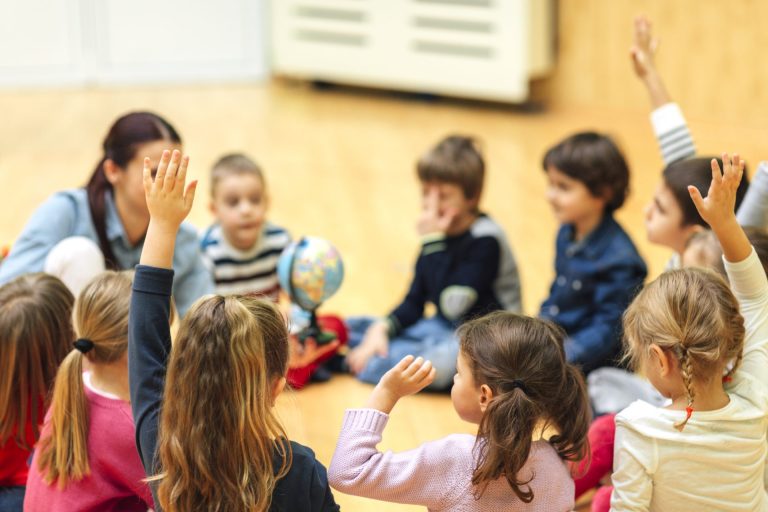You’ve done the school supply haul. You’ve labeled everything (yay!) You’ve taken the “first day of school” photo (three times because they blinked). And now… you wait.
What no one really prepares you for? The emotional, behavioral, and even biological whirlwind your child is about to enter. That first month of kindergarten can feel like your once-sweet kid morphed into a mix of a gremlin, a teenager, and a baby giraffe learning to walk—all rolled into one adorable tornado of a kid.
1. Expect the After-School Meltdown
They held it together all day. And now? You’re the safe zone- they unleashed the after-school restraint collapse.
Your kindergartener may walk through the door and crumble: tears, attitude, dramatic declarations like, “I’m NEVER going back!” This is normal.
School requires them to regulate all day—sitting still, sharing, remembering routines. When they get home, the emotional floodgates open.
How to help:
- Don’t pepper them with questions the second they walk in
- Offer a snack (protein + carb = magic)
- Create a quiet re-entry routine—books, cuddles, or solo play
2. Sleep Regression Is Real (Again)
You thought the sleepless nights were over? Joke’s on us, mama!
Some kids start waking earlier, resisting bedtime, or tossing and turning. Their brains are bursting with new information—rules, letters, even the solar system. It’s a lot.
Kindergarten marks a huge leap in cognitive development, and all that mental growth can disrupt their usual sleep rhythms. Their little minds are processing so much, sometimes leading to restlessness or nightmares. Plus, the excitement and anxiety of a new routine can make it harder for them to wind down. It’s totally normal, but tough for everyone. Just remember, this phase usually passes as their brains adjust and they settle into the new rhythm.
How to help:
- Bump bedtime earlier
- Avoid evening plans the first few weeks
- Reassure them: it’s okay to feel tired and overwhelmed
3. Food Fussiness Hits New Heights
Your usually adventurous eater now only wants beige foods and eats 10% of their lunch. Blame it on stress, peer influence, or exhaustion—maybe all three.
Starting school shakes up their world in a big way, and sometimes picky eating is their way of coping. New environments, different foods in the lunchroom, and the pressure to fit in can all make them cling to familiar, “safe” choices.
But it’s not just about taste or preference—their brains and bodies are responding to stress hormones like cortisol, which can suppress appetite and heighten sensitivity to new textures and smells. Their nervous systems might be on high alert from all the social and sensory input, making them less willing to try unfamiliar foods. Plus, fatigue can slow digestion and reduce hunger signals, so when exhaustion hits, their eating habits shift. It’s a natural, if frustrating, way their bodies try to protect and regulate themselves during a big life change.
How to help:
- Don’t turn food into a battleground
- Focus on breakfast and dinner for nutrition
- Keep lunch familiar, but sneak in one “safe surprise”
4. Emotional Whiplash Incoming
How to help:
- Validate: “That sounds really hard. I’d feel upset too.”
- Normalize mixed feelings
- Celebrate tiny wins: “You said hi to someone? Brave!”
5. Teachers Don’t Expect Perfection—You Shouldn’t Either
Kindergarten teachers don’t expect your child to arrive knowing everything. Here is what you can work on, but no pressure! That’s their job—to teach a lot of those skills.
Focus on letting the first month be all about transition—don’t stress about what they’re “actually” learning yet, because every day spent interacting with classmates and teachers is building important social and emotional skills.
6. “Reverting” Is Actually Growing
Your potty-trained child has an accident. Your independent kid clings like Velcro. That’s not regression—it’s transition.
It’s tough for parents to watch their little ones take steps backward after so much progress, but what looks like “reverting” is actually your child’s way of coping with big changes. When children face new challenges—like starting Kindergarten—they often feel uncertain or overwhelmed, even if they don’t fully understand or can’t express those feelings yet. Their brains and bodies respond by seeking safety and comfort, sometimes by returning to behaviors that once made them feel secure. This can include potty accidents or increased clinginess.
These behaviors aren’t signs of failure or bad habits sneaking back—they’re natural reactions to stress and growth.
How to help:
-
Meet them where they are — Even if it means letting them snuggle in your bed or take bathroom breaks without pressure. Your calm presence reassures their nervous system that they’re safe.
-
Build in extra connection time — Reading books together, playing, or just cuddling helps them feel seen and loved, which boosts their confidence and reduces anxiety.
-
Keep routines consistent — Predictability in daily schedules gives them a sense of control and safety amidst new experiences.
-
Use gentle reminders and patience — Avoid scolding or showing frustration, as this can heighten their stress and prolong the phase.
-
Remember: this phase is temporary — With your support, they’re learning to manage big emotions and changes. What feels like “backward” is actually a crucial part of growing forward.
In time, these moments of “reverting” will fade as your child feels more settled and capable, and you’ll both come out stronger on the other side.
7. Tips to Survive (and Support)
- Routine is your best friend. Predictability = security. Try a morning chart or visual calendar.
- Lower your expectations. Then lower them again. This is not the time for a family cleanse.
- Make room for big feelings. “This feels big, doesn’t it?” goes a long way.
- Celebrate the wins. Every tiny success is building their confidence.
Your kid is doing better than you think. So are you. Now go put your feet up. You’ve got about 11 years until high school starts. Oh, and don’t forget to label their stuff: 

